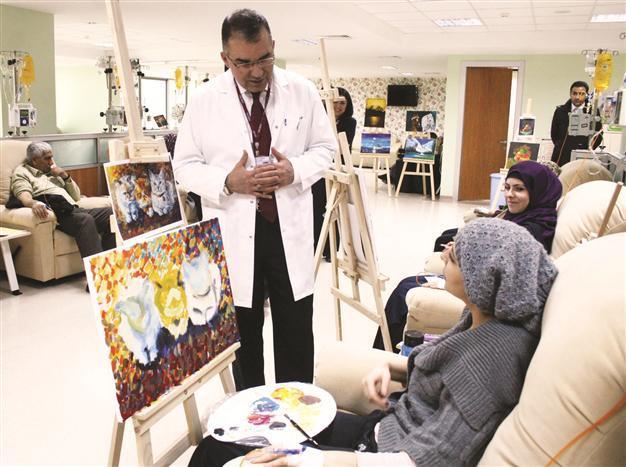Art has magic power in chemotherapy patients
ANKARA - Anatolia News Agency

Cancer patients at the Ankara Numune Education and Research Hospital listen to music and make painting during their chemotherapy sessions as part of the study. AA photo
The
Ankara Numune Education and Research Hospital has initiated a scientific project that examines the positive effects of painting and music classes applied to 100
cancer patients during chemotherapy treatment.
According to the first data from the project, it has been observed that stress hormones and anxiety levels of patients decrease to a great extent after such activities. Some patients come to the chemotherapy unit to attend painting classes even though they don’t have treatment that day.
The hospital’s head doctor, Professor Nurullah Zengin, said that they used the most modern cancer treatment methods in the hospital. Treatment decisions are taken during tumor councils and medicines are prepared with robotic methods.
“We don’t think the responsibility of doctors ends there. People have psychological sides, we think that artistic diversions can make a contribution to treatment of patients,” he said.
First results positive
After a proposal from Gazi University Faculty of Fine Arts Painting Department students, the hospital started working with 100 patients, and continued: “Considering that painting could decrease stress during chemotherapy treatment, we initiated a scientific work. We have prepared a protocol and discussed it in the hospital’s Scientific Research Commission. With its approval, we are applying this method for a month. Before painting classes, we measure stress levels under the inspection of psychologists. Later on, patients paint during the treatment and we measure their stress level again; we evaluate this data in the light of objective criteria. The work continues and we will share their result when we get scientific results,” Zengin said.
He said that first results of the project were very positive, adding, “Our patients have trouble as their chemotherapy day nears; they don’t want to come and get stressed. We have seen patients who come to the unit for painting even though it is not their treatment day. They say that it helps them to relax, and this is very striking to us. The method of treatment through art is applied abroad, so we are working to apply it in Turkey, too.”
Stress and anxiety decrease Gazi University Painting Department student Zeynep Gönülay said that supporting treatment was very important in cancer patients. “Patients forget their disease even for a short time by doing creative activities. When they channel their attention, their anxiety and stress decreases,” she said.
Oncology psychologist Melek Akçayılmazer said painting and music were indispensable factors in holistic treatment. “People are socially and spiritually whole. Therefore in cancer treatment, spiritual methods and occupational therapy should be used along with cognitive, mental and physical methods. These are very important factors to deal with the disease.”
Head doctor Zengin also said that the Traditional Turkish Music Research and Promotion Society (TÜMATA) had begun music therapy in the hospital, in addition to the art sessions.
He said that their goal was to boost morale to patients. “We think that music could help serve our goal, as well as painting classes. We plan to work with TÜMATA permanently.”
The founder of TÜMATA, Associate Professor Rahmi Oruç Güvenç, said it had been observed abroad that some patients came out of coma when they listened to music. “This result has brought a new understanding to treatment. It has become the issue of some studies,” he said.
“The effect of music has began to be discussed and works have been accelerated in immunology, geriatrics, cardiology and oncology. Some studies reveal that cases of fear, over-excitement and death have decreased thanks to CDs played during and after operations.”
Güvenç also said stress hormone of patients with chronic pains decreased by 40 percent following the music therapy in the algology department. “There were positive developments in studies carried out on children oncology in Austria, so we have started similar projects at Numune Hospital.”
